by: Tamara Amalia
Weeks ahead of COP28, Asia witnessed an awe-inspiring display of solidarity as thousands of younger generations took to the streets, demanding a just and fair transition towards a sustainable future. From Japan to Nepal, the Philippines to Taiwan, these young climate activists calling for urgent climate action and a transformative transition that leaves no one behind. Their collective efforts are part of the 350’s global month of action called Power Up, to demand a renewable, peaceful and equitable future for all.
Young people are undeniably the torchbearers of future generations, inheriting the consequences of the climate crisis and the responsibility to shape a sustainable world. In Japan, over 800 activists gathered at Shinjuku Station, singing a climate song and marching around the national parliament building with an elemental parachute banner. The climate concert and showpiece action in Tokyo served as a pivotal moment, offering them a platform to unite, voice their concerns, and solidify their determination for a greener future.

Organized by 350 Japan in collaboration with We Want Our Future, more than 800 of passionate individuals came together at Shinjuku Station, joining their voices in a powerful climate song that resonated through the heart of the city 🎶.
As one of the wealthiest countries in the region, Japan plays a crucial role in steering the course toward sustainability. It’s time for Japan to align its financial prowess with environmental responsibility. The call to action extends beyond the streets, urging Japan to cease financing fossil fuels and redirect those resources toward renewable energy projects.
Similar scenes unfolded in Jakarta, Indonesia, where more than 100 activists filled the streets. The march aimed to harness momentum among constituents to urge candidates in the upcoming presidential election to prioritize environmental issues.
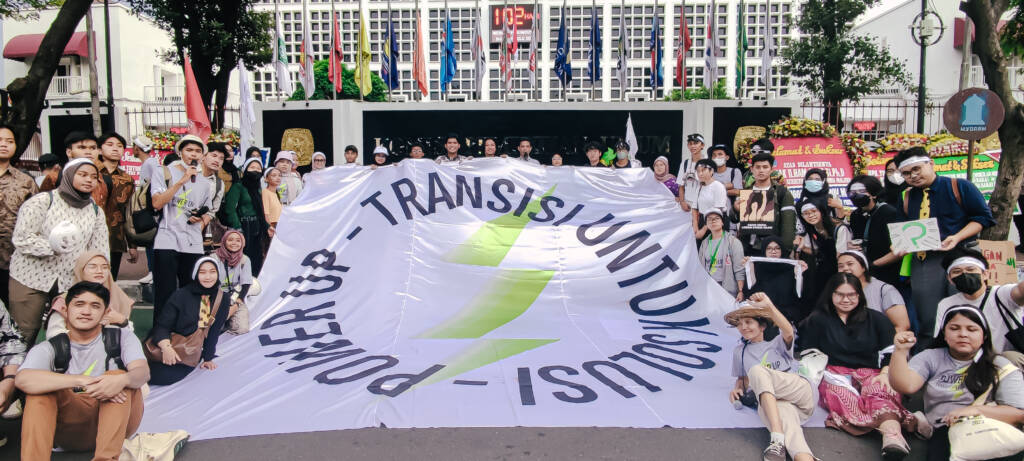
The Power Up Jakarta kicked off on November 3, where hundreds of young people and adults marched from the Public Defender Office to the Office of the General Election Commission of Indonesia. As Indonesia is undergoing a presidential election next year 🗳️, the march aimed to harness its momentum to urge potential presidential candidates to prioritize environmental issues in the upcoming presidential election
While actions took place in the capital, hundreds of other youth also joined the Power Up movement in various locations such as Bali, Surabaya, Yogyakarta, Bengkulu, Mataram, Cirebon, Jambi, Palangkaraya, and Bulumkumba. This decentralized activism illustrates the widespread commitment among the younger generation to drive change and ensure a more sustainable and equitable future for all.
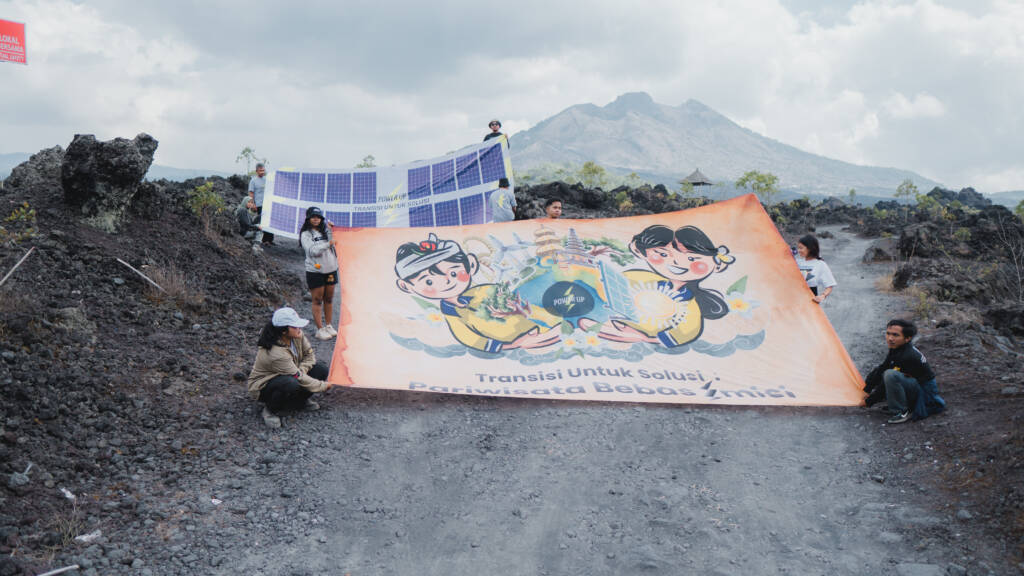
Power Up Batur was conducted in the caldera of Mount Batur. In this caldera, there is the potential for the development of renewable energy installations, namely solar power plants. This location was chosen to demonstrate to the government that we do not need to evict local communities and destroy the environment to build renewable energy sources. Critical land that cannot support tree growth is the solution for land needs if the government wants to construct centralized power plants. Even though they are centralized, ownership must still be transferred to the community. 🌄🌿
Women, particularly those hailing from vulnerable communities and residing in disaster-prone regions, often bear a disproportionate burden of the climate crisis. They face unique challenges, including limited access to resources, reduced mobility, and unequal socio-economic status, which exacerbate the impacts of climate change on their lives.
In Bangladesh, The march in Satkhira, was predominantly led by women demanding an end to financial support for and investment in fossil fuels in favor of practical climate solutions. The inclusion of young people with disabilities highlighted inclusivity and determination.
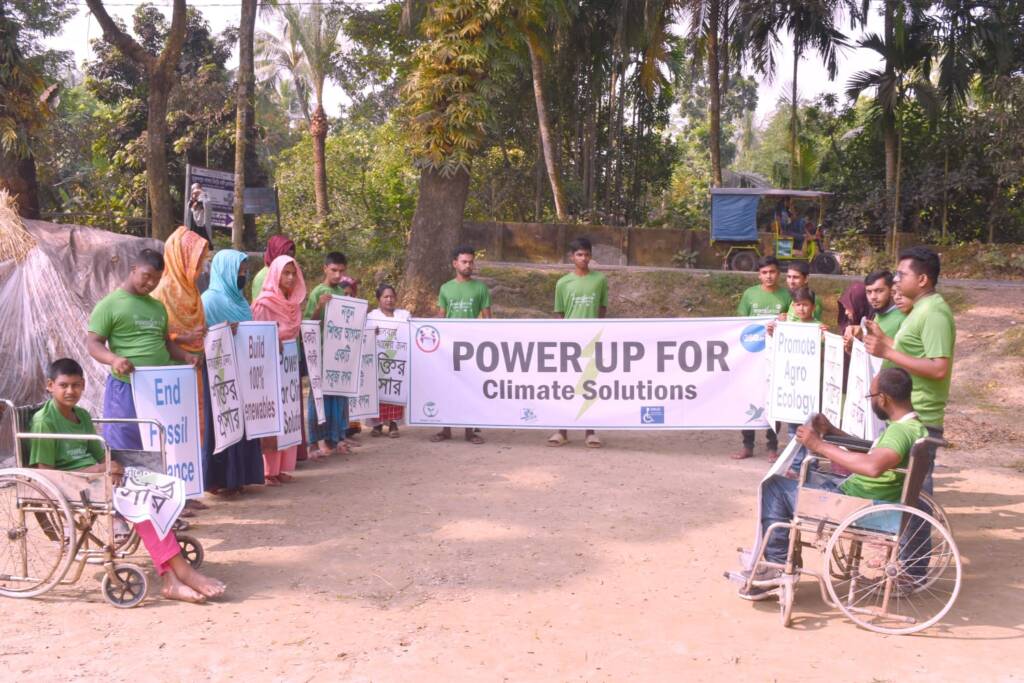
Power Up Actions have kicked off in Bangladesh on November 3. Led by women, the Green New Deal Hub in Satkhira is calling for an end to fossil fuel finance and investment in real climate solutions. 🌿💪♀️ This activity was attended by young people with disabilities, demonstrating the inclusivity and determination of the movement. ♿🌍 #powerupbangladesh
Meanwhile, in the remote Chimbuk Village of Bandorban, a group of youth installed electricity to homes in the village. Despite progress, many villages, like Chimbuk, still lack basic amenities. This grassroots initiative exemplifies the interconnected challenges faced by communities, where access to energy remains a significant hurdle.
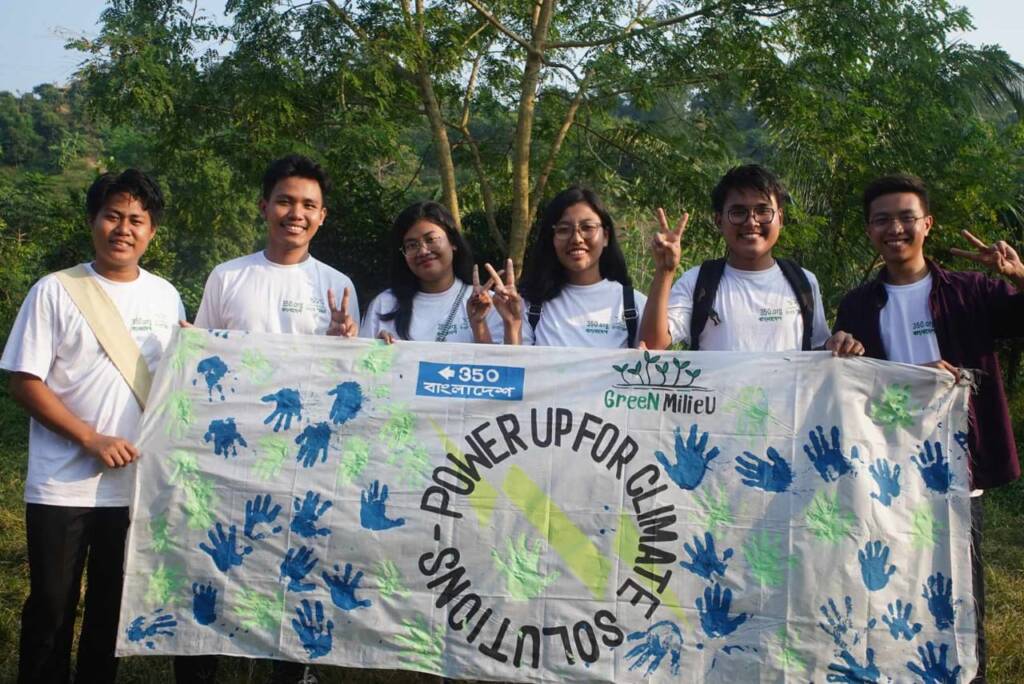
On November 4, children of a village school in Chimbuk, Bandarban lit up their school with solar power as part of the Global Power Up Mobilisation.
In other country in the South Asia region, Nepal, a nation characterized by its diverse topography and vulnerability to climate change, young activists organized events in Kathmandu and Pokhara. The call for sustainable practices resonated in a country where the Himalayan ecosystems are particularly sensitive to global warming. The youth emphasized the need for community-based initiatives to address environmental challenges and underscored the importance of preserving Nepal’s unique culture and biodiversity.

A group of climate activists in Pokhara, Nepal, geared up forming a sun through boat action, calling for a Rapid and Just Transition to Renewable Energy in Nepal.
#powerupnepal
In Taiwan, the call for climate action echoed loudly as an estimated 200 young activists hosted an outdoor climate parade “Back to the Future” in front of Taipei 101 to urge governments to increase taxes on the fossil fuel industry. With colorful banners and “electric car” stunt, they demanded that the Taiwanese government prioritize renewable energy investments over fossil fuels. Taiwan, known for its technological prowess, has the potential to become a leader in sustainable innovation, and the youth are urging leaders at COP28 to seize this opportunity.
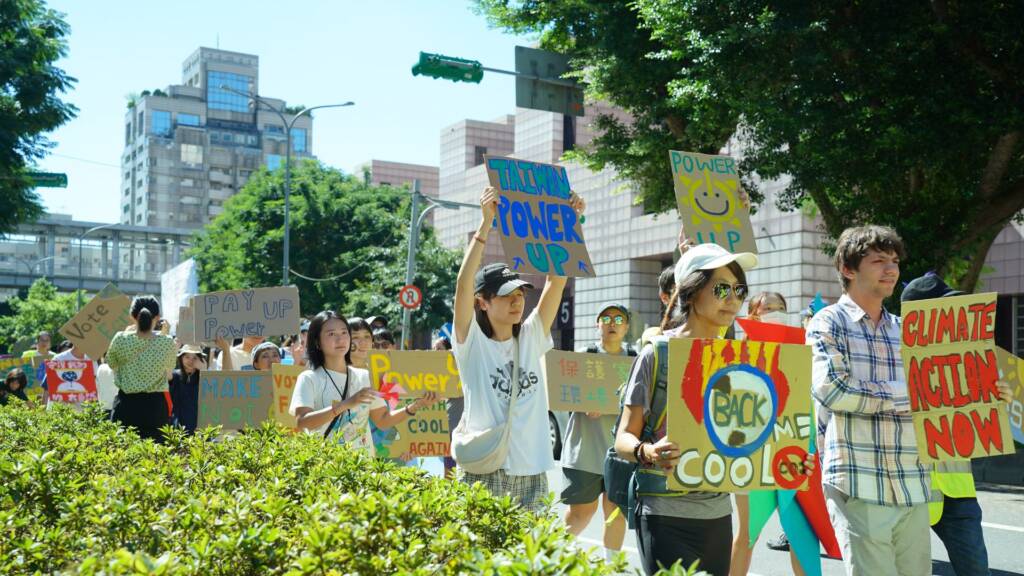
This movement aimed to raise public awareness about the climate crisis and encouraged Taiwanese society to prioritize climate issues and collectively safeguard the environment’s future. 🌍💪 #poweruptaiwan
In Mongolia, a country grappling with the environmental consequences of rapid industrialization and mining, youth activists organized capacity-building discussions and took to the streets in front of the Parliament building on Sukhbaatar Square. Carrying banners and raising their voices, they passionately advocated for clean air for all, recognizing the critical importance of environmental health in the face of industrial challenges.
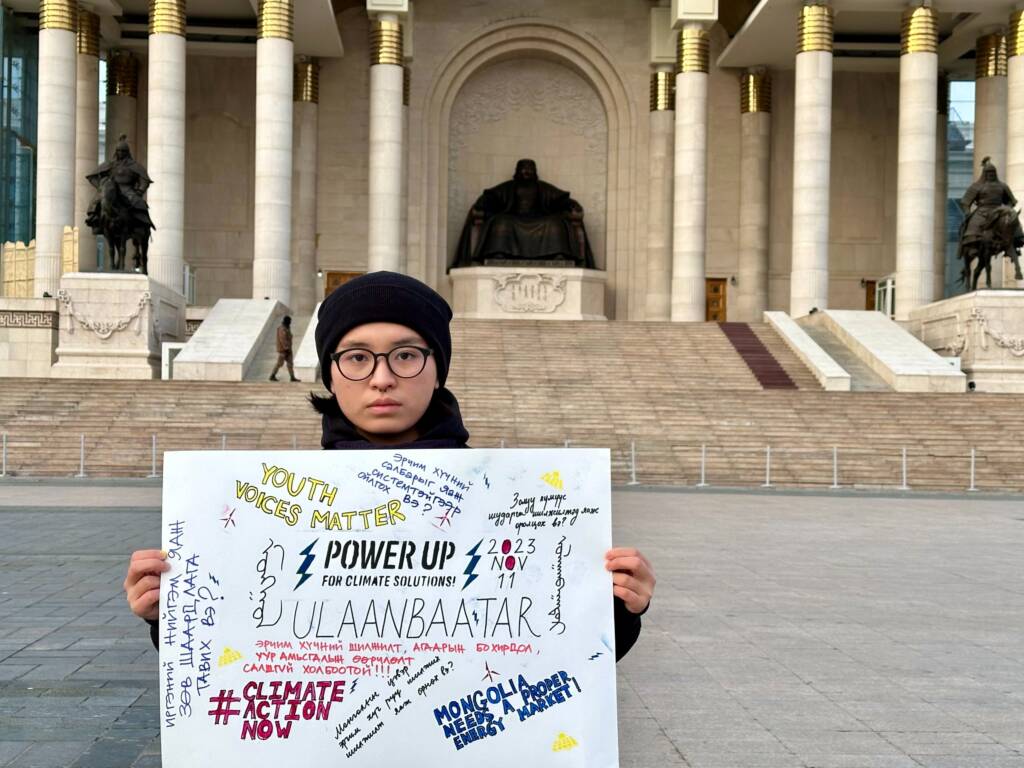
Activists from Ulaanbaatar, Mongolia organized by @greendot.vip mapped the past, present, and future of Mongolia’s energy industry and shared insights on transitioning towards renewable energy. This is part of the month-long #PowerUp
Meanwhile, in the Philippines, 360 Indigenous Kalanguya students and their teachers from Binalian Elementary School and Binalian Integrated National High School united to promote community-driven renewable energy solutions. The movement in Nueva Vizcaya called on governments and financial institutions to redirect resources towards community-based renewable energy solutions. The event showcased the dedication of Indigenous Kalanguya students and their teachers to drive positive change in their communities and advocate for sustainable, low-carbon energy solutions.

In celebration of Indigenous People’s Month, 360 Indigenous Kalanguya students and teachers from Binalian Elementary School and Binalian Integrated National High School came together to champion community-driven renewable energy solutions.
The significance of climate education cannot be overstated, as it plays a pivotal role in fostering environmental awareness and empowering communities to address the challenges posed by climate change. A group of young individuals convened to discuss the critical issue of biodiversity loss in Thailand. The focus of their discussion was to shed light on the vital importance of preserving biodiversity in a world facing rapid environmental changes.
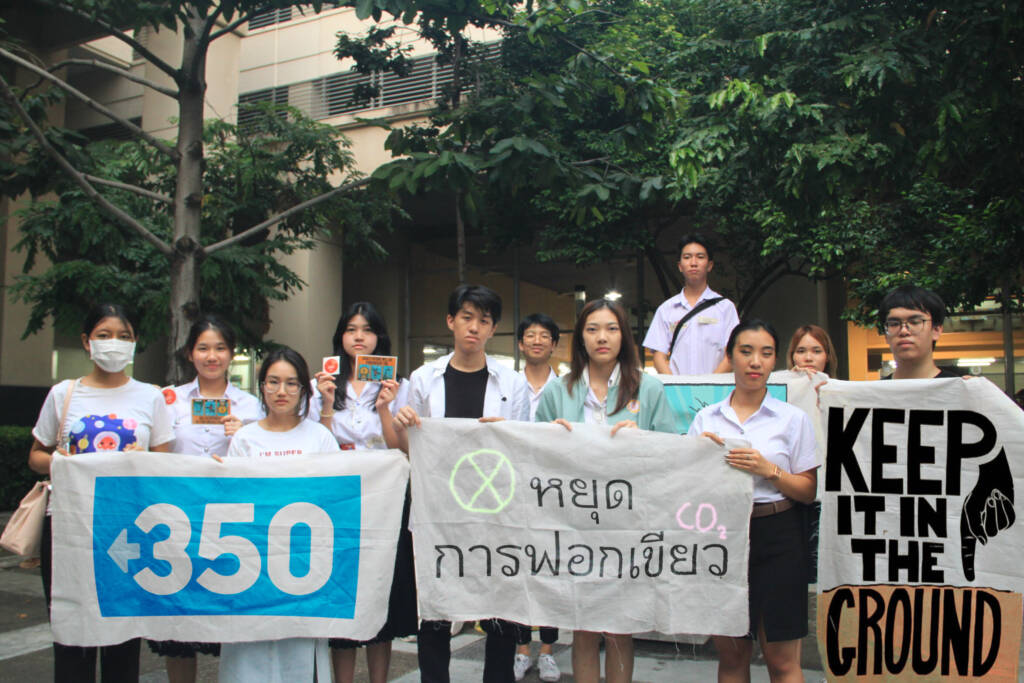
Youth gather for a discussion about the problem of biodiversity loss in Bangkok, Thailand. They organise a debate and present case studies.
350 Asia urges leaders attending COP28, with a specific emphasis on those from affluent nations and historical contributors to emissions, to respond to the climate crisis by acknowledging the pivotal role played by younger generations as catalysts for change. It is imperative to enhance climate finance, allocating resources for addressing losses and damages, as well as supporting climate adaptation efforts.
Governments are called upon to swiftly implement measures to restrict the rise in temperatures to 1.5C above pre-industrial levels, safeguarding the well-being and prospects of younger generations.